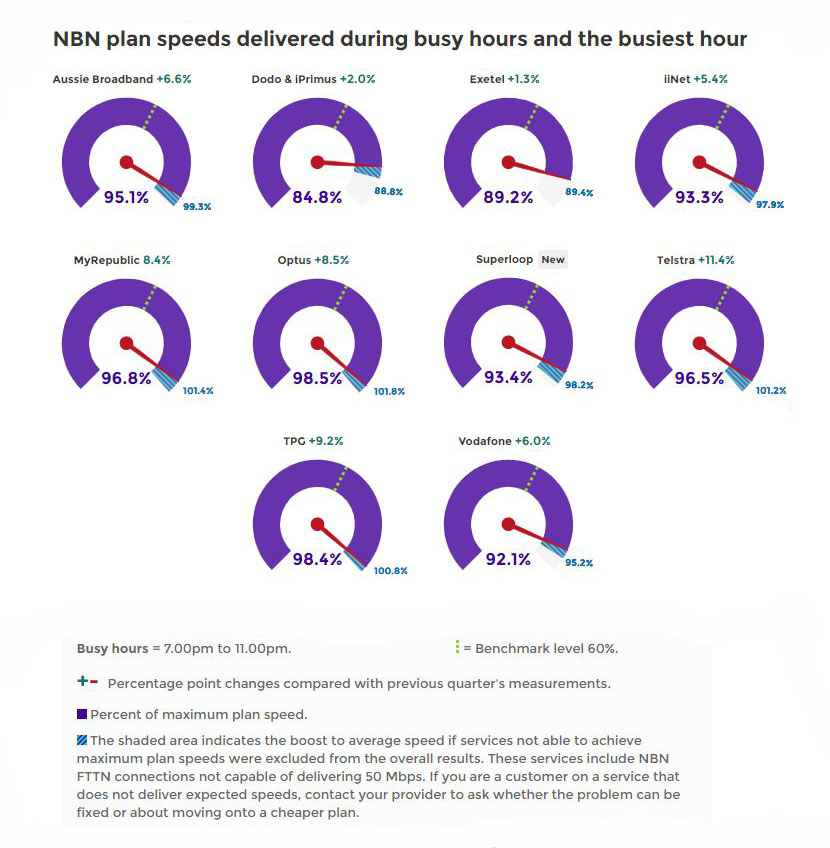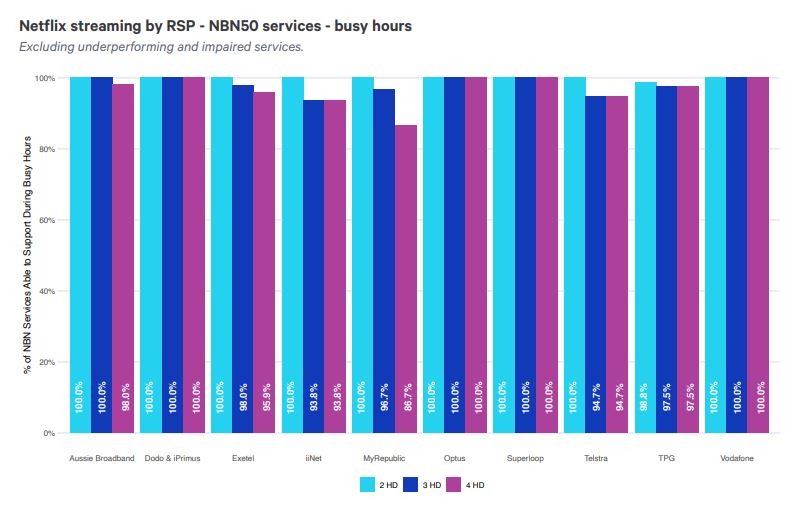The Australian Competition and Consumer Commission (ACCC) has released its 11th report into real-world NBN performance, tallying data on the biggest providers to see which telco offers the fastest speeds. This quarter’s report covers the October 2020 test period, and while all included providers have delivered faster download speeds since the ACCC’s previous report – and offered the best performance across-the-board since the regulator began testing in 2018 – one telco continues to dominate.
Optus has once again reigned supreme in the ACCC’s NBN provider rankings, offering the fastest average download speeds each evening and narrowly beating out former star performer TPG. This is Optus’ fifth number-one spot in a row, with the telco dominating the speed report since November of 2019.
The ACCC performed more than 219,580 download speed tests over 31 days for its December report, which compared 11 of Australia’s most popular NBN providers – including Optus, Telstra, TPG, Aussie Broadband, iiNet, Vodafone, MyRepublic, Dodo and Primus, Exetel, and new entrant Superloop.
Rankings are determined by measuring the average download and upload speeds achieved by each provider’s plans during the busy evening hours of between 7pm and 11pm. Results are calculated as a percentage of the maximum possible speed offered by each plan; the closer a telco’s result is to 100%, the more consistently fast its plans were over the ACCC’s testing period.
Fastest download speeds: Optus again #1
For the fifth quarter in a row, Optus smashed out a number-one ranking, offering an average busy hour performance of 98.5% of the potential achievable speed on tested plans. In second place again was TPG, hitting an average of 98.4% over the test period, with MyRepublic delivering 96.8% to nab third.
All featured providers (with the exception of newcomer Superloop) showed significant improvement in speeds when compared to the ACCC’s previous report. Telstra’s average speeds jumped by an impressive 11.4%, TPG by 9.2%, MyRepublic by 8.4%, and Optus by 8.5%, with almost all telcos (besides Dodo/iPrimus and Exetel) scoring results over 90%.
The full download speed results are:
- Optus: 98.5%
- TPG: 98.4%
- MyRepublic: 96.8%
- Telstra: 96.5%
- Aussie Broadband: 95.1%
- Superloop: 93.4%
- iiNet: 93.3%
- Vodafone: 92.1%
- Exetel: 89.2%
- Dodo & iPrimus: 84.8%
If you’re interested in plans from the above providers, we’ve listed several below. The following table shows a selection of published unlimited Standard Plus Evening Speed (NBN 50) plans on Canstar Blue’s database, listed in order of their cost, from the lowest to highest and then by data allowance, largest to smallest. Use our comparison tool to see plans from a range of other providers. This is a selection of products with links to a referral partner.
Optus ‘speed leadership’
Speaking on behalf of this quarter’s highest-ranking telco, Optus’ Vice President of Regulatory and Public Affairs, Andrew Sheridan, said the company was “very pleased” with the ACCC’s speed test results.
“We know that our speed leadership makes a real difference to our customers’ experience, and will continue to strive to meet and exceed their expectations,” said Mr. Sheridan.

Fastest Netflix streaming speeds
Introduced in the previous report, the ACCC now also measures average Netflix streaming performance during busy hours. These tests measure the ability of each telco to deliver two, three or four simultaneous high-definition streams on NBN 50 services during the 7pm-11pm peak usage period.
Results are calculated by showing the percentage of tests from each provider that were able to reliably stream HD Netflix uninterrupted. Optus, Superloop, Vodafone, and Dodo/iPrimus each achieved a 100% score in all tests, including streaming four HD videos simultaneously. The results were strong across the board, with a noticeable improvement from MyRepublic (with 86.7% of tests across four HD screens successful, compared to just 57.7% last quarter).

Fastest upload speeds
Exetel continues to deliver the fastest average NBN upload speeds, with a performance score of 90.1% and topping the upload rankings for the third consecutive quarter. MyRepublic took second place with 88.0%, while new entry Superloop scored bronze with a respectable 86.0%.
The full upload speed results are:
- Exetel: 90.1%
- MyRepublic: 88.0%
- Superloop: 86.0%
- TPG: 85.7%
- Vodafone: 85.6%
- Dodo & iPrimus: 84.6%
- Aussie Broadband: 84.4%
- Optus: 84.1%
- Telstra: 83.1%
- iiNet: 82.9%
ACCC: NBN speed tests reach record highs
After a year of increasing demands on the broadband network thanks to the COVID-19 pandemic, it’s almost expected that providers would begin to show signs of strain. But in good news for the often beleaguered NBN, speeds have actually reached record highs not seen by the ACCC since the inception of its testing program in early 2018.
“Speeds in the October test period were the highest we have seen for all monitored RSPs since the start of the MBA program,” said ACCC Chair Rod Sims.
“NBN Co’s decision to temporarily waive charges for up to 40 per cent extra capacity for RSPs in the form of increased connectivity virtual circuit (CVC) has played a key role in supporting broadband speeds during the pandemic.”
Over half of included providers achieved download speeds faster than the maximum speeds listed in their plan descriptions, showing that both telcos and NBN Co are going above and beyond to offer customers a reliable performance post-COVID 19 lockdowns.
NBN Co’s earlier offer of 40% more capacity for NBN providers expired on November 30, which may mean that speeds will now start to drop back down – or plan prices may rise – if data demands continue. However, NBN Co is now offering transition credits to eligible providers, which will make it easier for participating telcos to taper back to normal network capacity between now and February of next year.
In other good news, NBN Co is introducing extra incentives for providers to offer cheaper fast NBN 100, NBN 250 and NBN 1000 plans. Called the ‘Focus on Fast’ campaign, the project will see NBN Co provide additional bandwidth inclusions for participating providers, as well as implementing six-month wholesale pricing rebates from February 2021.
In short, these actions will enable retailers to offer fast NBN plans at discounted introductory prices, allowing more Aussie homes to upgrade to a faster broadband experience at a lower price.


Share this article